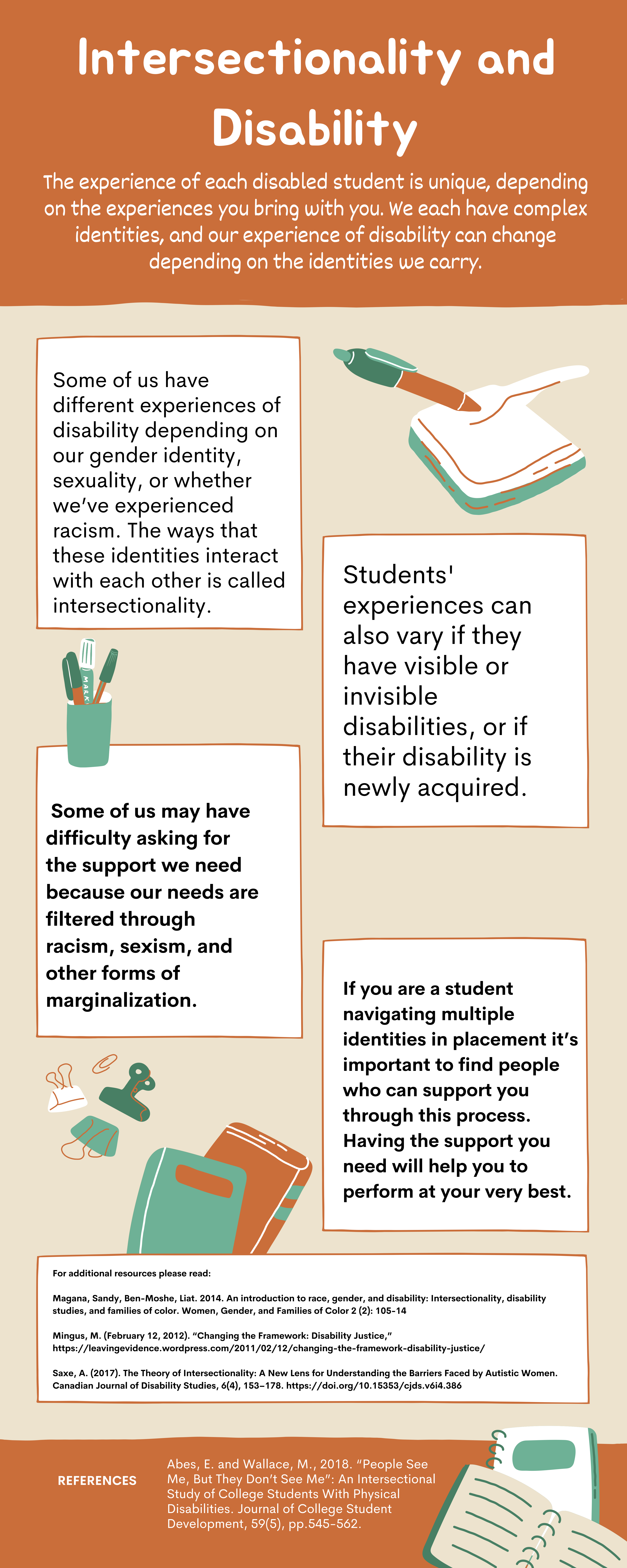Intersectionality and Disability Tip Sheet
Reading time: approximately 4 minutes.
The experience of each disabled student is unique, depending on the experiences they bring with them. We each have complex identities, and our experience of disability can change depending on the identities we carry.
Ableism can impact how we see ourselves in those identities. Ableism is a form of discrimination which shapes societal attitudes toward people with disabilities. It can be intentional or unintentional and assumes that disabled students have less to offer or less capacity to get things done.
Microaggressions are a form of discrimination that can occur through ableism or other forms of oppression. While often unintended, the effects of these small acts of stereotyping bias build up over time. It is exhausting to cope with these assumptions day after day. With ableist microaggressions, well-intentioned assumptions about what a disabled student can do can contribute to student frustration and burnout.
Some of us have different experiences of disability depending on our gender identity or sexuality or on on whether we’ve experienced racism. The ways that these identities interact with each other is called intersectionality. For example, if a Black disabled student and a White queer disabled student both work in same placement, they may have very different experiences of disability discrimination because of the multiple identities they carry.
Abes and Wallace (2018) note that certain identities can be emphasized over others in our lives; they describe this as intersectional erasure. Some of us may have difficulty asking for the support we need because our needs are filtered through racism, sexism, and other forms of marginalization. We may fear asking for the support we need if people will then blame this need on our race or gender identity.
Students’ experiences can also vary if they have visible or invisible disabilities, or if their disability is newly acquired. We might not have had access to the supports we needed in the past, or we might not know what supports we need in this new experience of placement. It is okay not to know everything you might need right now; that knowledge will grow over time.
If you are a student navigating multiple identities in placement, it’s important to find people who can support you through this process. Having the support you need will help you to perform at your very best. Consider this simplified example: able-bodied, neurotypical people use support to be their best self on a regular basis, whether this support is in the form of multiple cups of coffee, childcare, or help in solving a difficult problem. Disability supports are often more stigmatized, but you have as much right to work at your best as anyone else.
If you can find mentors with similar life experience to yours, it can help you to navigate experiences in your chosen field and to build a network for future career opportunities. It is important to remember that you do not have to disclose your disability status to anyone, but being a disabled student can be isolating at times. Most people seek out mentorship during their career, and placement is a good place to start.
Intersectionality and Disability Infographic (PDF)

This concludes the ACTon Preparatory Resources.
Choose from one of the below links to watch the ACTon videos and access other ACTon learning materials:
Additional Resources
- Desmond-Harris, Jenee. (2015). What exactly is a microaggression? Vox. https://www.vox.com/2015/2/16/8031073/what-are-microaggressions
- Lu, Wendy. (2016). 13 Microaggressions People With Disabilities Face. Bustle. https://www.bustle.com/articles/186060-13-microaggressions-people-with-disabilities-face-on-a-daily-basis
- Magana, Sandy, Ben-Moshe, Liat. 2014. An introduction to race, gender, and disability: Intersectionality, disability studies, and families of color. Women, Gender, and Families of Color 2(2): 105-14
- Mingus, M. (February 12, 2012). Changing the Framework: Disability Justice. https://leavingevidence.wordpress.com/2011/02/12/changing-the-framework-disability-justice/
- Saxe, A. (2017). The Theory of Intersectionality: A New Lens for Understanding the Barriers Faced by Autistic Women. Canadian Journal of Disability Studies, 6(4), 153–178. https://doi.org/10.15353/cjds.v6i4.386
Source
Abes, E. and Wallace, M., 2018. “People See Me, But They Don’t See Me”: An Intersectional Study of College Students with Physical Disabilities. Journal of College Student Development, 59(5): 545-62.

